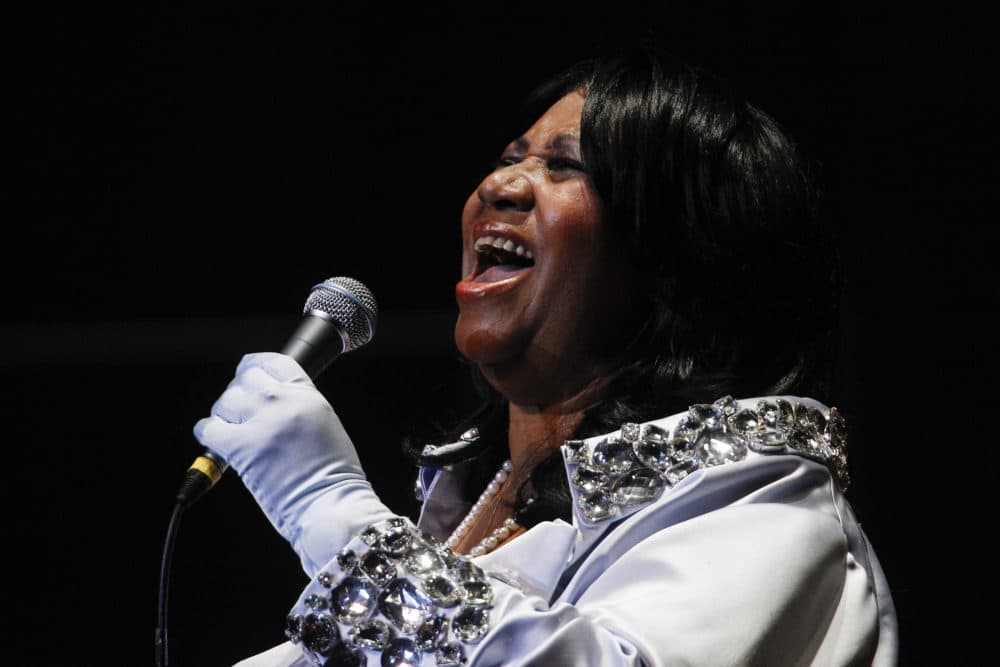Advertisement
How 'Queen Of Soul' Aretha Franklin Shaped Music And American Culture
Resume
Aretha Franklin, the "Queen of Soul," died Thursday in Detroit after a battle with pancreatic cancer. She was 76. Franklin took soul music to a new level and inspired generations of singers who came after her.
Here & Now's Robin Young and Lisa Mullins listen back to some of Franklin's best-known songs, and discuss her life, career and cultural impact with Mark Anthony Neal (@NewBlackMan), professor of African-American studies at Duke University.
"I would argue 'Queen of Soul' is really a misnomer," Neal says. "She came to prominence obviously as kind of the face of soul music as it became this mainstream cultural phenomenon. But, I describe her as the greatest American singer of the 20th century, in part because of her mastery of multi-genres."
Interview Highlights
On his own experience watching Franklin live in 1971
"My parents took me to see Aretha Franklin at the Apollo Theater in 1971. She did a weeklong stay there at the Apollo Theater. Famously, you'll see on the facade — there are photos of it — 'She's Home: Aretha Franklin.'
"That wasn't my first introduction to her, but that was the first time of course I had a chance to see her live."
"I would argue 'Queen of Soul' is really a misnomer ... I describe her as the greatest American singer of the 20th century, in part because of her mastery of multi-genres."
Mark Anthony Neal
On Franklin's nickname, the "Queen of Soul," her ability to master different genres and her legacy
"This is a woman who of course comes up in the black church, but she's also deeply steeped in the blues. She also has a capacity to sing gospel ... but she also was adept at singing jazz. She could sing pop standards alongside Barbra Streisand, who was her label mate in the 1960s before she moved to Atlantic. When she does that time at the Fillmore West, she's singing basically hippy rock music to an audience of hippies. She had this capacity to be able to own any song in any genre in which she added her voice to."
On Franklin's popular rendition of Otis Redding's song, "Respect"
"Yeah, I mean, you always have to remember it is Otis Redding's song, right. The way that she literally stops and spells out respect — even though it wasn't a political song, it had resonance amongst African-Americans as a political song and obviously becomes an obvious reference when we start to see the women's movement find its own footing in the late 1960s and early 1970s. Otis Redding famously said after he heard her version of the song, 'That gal dun' stole my song.' But then he goes, 'She's a friend, so it's OK.' "
On Franklin's roots singing gospel at Baptist churches, and the song "Mary, Don't You Weep"
"'Mary, Don't You Weep' was a classic recording done by The Caravans in 1958. [The] Caravans were gospel music's first supergroup. Within them, they had Inez Andrews. They also had Shirley Caesar. The pianist for the group was the Rev. James Cleveland. And so [Franklin is] in this church in Los Angeles basically returning to her gospel roots and paying tribute to all the folks who had helped her become the voice that she became.
"Sitting in the front row was the great Clara Ward, who was her greatest influence. Clara Ward of The Ward Singers, she was Aretha's greatest influence. So this is an opportunity for her at the height of her fame to acknowledge the roots that her career was grounded in."
On Franklin's time at the Fillmore West in San Francisco in 1971, her rendition of Simon and Garfunkel's song "Bridge Over Troubled Water" and her performance with Ray Charles
"This is a Simon and Garfunkel song. She does three nights at the Fillmore West in 1971. Jerry Wexler, who is a producer at the time, literally says, 'Let's go conquer the hippies.' And so, in this crowd of hippies, literally, she takes standards of that era and transforms them into something that was just something else.
"That same three-night stand at Fillmore West, she does a song called 'Spirit in the Dark,' and she's joined on stage by Ray Charles. It is just an amazing tribute to who she was and who she was able to reach, and she earned a whole new audience with that successful stand at the Fillmore West."
On what aspiring singers can learn from Franklin
"She performed for 60 years. She had a 60-year career, and even as her voice changed and matured and became more weathered, it sounded different, but she was in such control of her instrument that she still was absolutely brilliant."
This segment aired on August 16, 2018.



